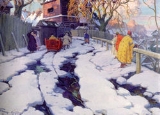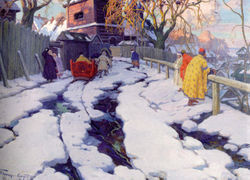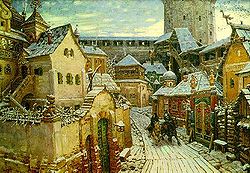
Notes on Muscovite Affairs
Encyclopedia
Notes on Muscovite Affairs (Rerum Moscoviticarum Commentarii) (1549) was a Latin
book by Baron Sigismund von Herberstein
on the geography, history and customs of Muscovy (the 16th century Russia
n state). The book was the main early source of knowledge about Russia in Western Europe.
n ambassador, in 1517 and 1526. Born in Vipava
(German
Wippach), Slovenia
, he was familiar with Slovene, a Slavic
language, which became important later on his mission in Russia
, when he was able to communicate with ordinary Russians
in Russian
, another Slavic language
.
These visits occurred at a time when very little was known about Russia outside the region. The few published descriptions of Russia were in some cases wildly inaccurate.
 Muscovy in the 16th century was the Russian state which succeeded the Kievan Rus'
Muscovy in the 16th century was the Russian state which succeeded the Kievan Rus'
in the 14th century and the 15th century before it evolved into the Russian Empire
under Peter the Great
starting at the end of the 17th century. Russia was the region, Muscovy was the state until it no longer included just Moscow. Muscovy was then ruled by the Muscovite monarchy, starting with Ivan III (1462–1505), who expanded Muscovy, and ending with Ivan IV, who claimed the title "Tsar of Russia".
In this article, Russia and Muscovy are treated as similar entities. In land area there is not much difference between Muscovy and Russia west of the Ural Mountains
. Herberstein wrote about Muscovy (region based on Moscow) because that is what it was known as in the West then. We know the area as Russia, so that is how it is referred to here.
The book contributed greatly to a European view held for several centuries of Russia as a despotic absolute monarchy. This view was not new, but previous writers presented an idealized view. Herberstein influenced the development of this view in two ways:
 His investigations made it clear that Muscovy, contrary to the view of fanatical loyalty, had suffered a violent political struggle and that Muscovy had emerged only very recently as the dominant power in the region. What's more, the man who achieved the unification of Muscovy, Ivan III was characterized by Herberstein as a cruel tyrant, drunk, and a misogynist; far from being a ruler of great fairness and equity.
His investigations made it clear that Muscovy, contrary to the view of fanatical loyalty, had suffered a violent political struggle and that Muscovy had emerged only very recently as the dominant power in the region. What's more, the man who achieved the unification of Muscovy, Ivan III was characterized by Herberstein as a cruel tyrant, drunk, and a misogynist; far from being a ruler of great fairness and equity.
His description of Ivan's unification campaign was a series of banishments and forced relocations of whole populations to break the power of regional rulers. This culminated in, as Herberstein wrote, Ivan's "plan of ejecting all princes and others from the garrisons and fortified places" all the formerly independent princes of Russia, "being either moved by the grandeur of his achievements or stricken with fear, became subject to him." All very much at odds with previous perceived reality, but much closer to currently understood Russian history. Similarly the previously touted ideal of the fairness of the Muscovy monarchy was contrasted with Herberstein's depiction of peasants as being in "a very wretched condition, for their goods are exposed to plunder from the nobility and soldiery".
Tsar
One final thing for which Herberstein and his book was noted, though not widely understood, was his contribution to a spelling confusion which did not emerge until the end of the 19th century and still causes disagreement: he recorded the spelling of tsar as czar. This cz spelling is used only in the Polish language
; although the spelling varies, most Slavonic languages use the ts pronunciation, and usually that spelling in the Romanised form. English and French moved from the cz spelling to the ts spelling in the 19th century. Note that cz was as good a spelling as any at the time Herberstein recorded it.
, who has written extensively on Herberstein and Russian history generally, uses the English title Notes on the Muscovites consistently when translating the Latin title. A slightly more precise English translation of the Latin title would be Notes on Muscovite Affairs, as used for this article. There are one partial and two complete English translations of this work, the most recent one, by J. B. C. Grundy, based itself on a German version.
Others:
Latin
Latin is an Italic language originally spoken in Latium and Ancient Rome. It, along with most European languages, is a descendant of the ancient Proto-Indo-European language. Although it is considered a dead language, a number of scholars and members of the Christian clergy speak it fluently, and...
book by Baron Sigismund von Herberstein
Sigismund von Herberstein
Siegmund Freiherr von Herberstein, , was an Carniolan diplomat, writer, historian and member of the Holy Roman Empire Imperial Council...
on the geography, history and customs of Muscovy (the 16th century Russia
Russia
Russia or , officially known as both Russia and the Russian Federation , is a country in northern Eurasia. It is a federal semi-presidential republic, comprising 83 federal subjects...
n state). The book was the main early source of knowledge about Russia in Western Europe.
Background
Herberstein was an Austrian diplomat who was twice sent to Russia as AustriaAustria
Austria , officially the Republic of Austria , is a landlocked country of roughly 8.4 million people in Central Europe. It is bordered by the Czech Republic and Germany to the north, Slovakia and Hungary to the east, Slovenia and Italy to the south, and Switzerland and Liechtenstein to the...
n ambassador, in 1517 and 1526. Born in Vipava
Vipava, Slovenia
Vipava is a small town in western Slovenia with 1500 inhabitants. It is the center of a municipality with 5,185 people. Vipava is built near the numerous sources of the Vipava River, in the upper Vipava Valley, 102 m above sea level...
(German
German language
German is a West Germanic language, related to and classified alongside English and Dutch. With an estimated 90 – 98 million native speakers, German is one of the world's major languages and is the most widely-spoken first language in the European Union....
Wippach), Slovenia
Slovenia
Slovenia , officially the Republic of Slovenia , is a country in Central and Southeastern Europe touching the Alps and bordering the Mediterranean. Slovenia borders Italy to the west, Croatia to the south and east, Hungary to the northeast, and Austria to the north, and also has a small portion of...
, he was familiar with Slovene, a Slavic
Slavic languages
The Slavic languages , a group of closely related languages of the Slavic peoples and a subgroup of Indo-European languages, have speakers in most of Eastern Europe, in much of the Balkans, in parts of Central Europe, and in the northern part of Asia.-Branches:Scholars traditionally divide Slavic...
language, which became important later on his mission in Russia
Russia
Russia or , officially known as both Russia and the Russian Federation , is a country in northern Eurasia. It is a federal semi-presidential republic, comprising 83 federal subjects...
, when he was able to communicate with ordinary Russians
Russians
The Russian people are an East Slavic ethnic group native to Russia, speaking the Russian language and primarily living in Russia and neighboring countries....
in Russian
Russian language
Russian is a Slavic language used primarily in Russia, Belarus, Uzbekistan, Kazakhstan, Tajikistan and Kyrgyzstan. It is an unofficial but widely spoken language in Ukraine, Moldova, Latvia, Turkmenistan and Estonia and, to a lesser extent, the other countries that were once constituent republics...
, another Slavic language
Slavic languages
The Slavic languages , a group of closely related languages of the Slavic peoples and a subgroup of Indo-European languages, have speakers in most of Eastern Europe, in much of the Balkans, in parts of Central Europe, and in the northern part of Asia.-Branches:Scholars traditionally divide Slavic...
.
These visits occurred at a time when very little was known about Russia outside the region. The few published descriptions of Russia were in some cases wildly inaccurate.
Historical note on Muscovy and Russia

Kievan Rus'
Kievan Rus was a medieval polity in Eastern Europe, from the late 9th to the mid 13th century, when it disintegrated under the pressure of the Mongol invasion of 1237–1240....
in the 14th century and the 15th century before it evolved into the Russian Empire
Russian Empire
The Russian Empire was a state that existed from 1721 until the Russian Revolution of 1917. It was the successor to the Tsardom of Russia and the predecessor of the Soviet Union...
under Peter the Great
Peter I of Russia
Peter the Great, Peter I or Pyotr Alexeyevich Romanov Dates indicated by the letters "O.S." are Old Style. All other dates in this article are New Style. ruled the Tsardom of Russia and later the Russian Empire from until his death, jointly ruling before 1696 with his half-brother, Ivan V...
starting at the end of the 17th century. Russia was the region, Muscovy was the state until it no longer included just Moscow. Muscovy was then ruled by the Muscovite monarchy, starting with Ivan III (1462–1505), who expanded Muscovy, and ending with Ivan IV, who claimed the title "Tsar of Russia".
In this article, Russia and Muscovy are treated as similar entities. In land area there is not much difference between Muscovy and Russia west of the Ural Mountains
Ural Mountains
The Ural Mountains , or simply the Urals, are a mountain range that runs approximately from north to south through western Russia, from the coast of the Arctic Ocean to the Ural River and northwestern Kazakhstan. Their eastern side is usually considered the natural boundary between Europe and Asia...
. Herberstein wrote about Muscovy (region based on Moscow) because that is what it was known as in the West then. We know the area as Russia, so that is how it is referred to here.
Research
Herberstein developed a keen interest in all things Russian, and researched in several ways:- using his knowledge of Slavic, he questioned a variety of people on a wide range of topics.
- careful review of existing publications on Russia, comparing what he read with his own observations. He viewed most publications skeptically, because he knew that most of the authors had not been able to actually visit Russia.
- corroboration. He was careful to make sure not to accept anything that was not well corroborated. As he wrote, he "did not rely upon this or that man's account, but trusted only to the unvarying statements of many."
- investigation of Russian written publications, which provided him with information on Russian culture completely unavailable at the time in Europe.
The Book
As a result, Herberstein was able to produce the first detailed eyewitness ethnography of Russia, encyclopedic in its scope, providing an accurate (very accurate for the time) view of trade, religion, customs, politics, history, even a theory of Russian political culture.The book contributed greatly to a European view held for several centuries of Russia as a despotic absolute monarchy. This view was not new, but previous writers presented an idealized view. Herberstein influenced the development of this view in two ways:
- he accentuated the absolute power of the monarchy even more than previous works had done. Writing about the Russian Tsar, Herberstein wrote that "in the power he holds over his people the ruler of Muscovy surpasses all the monarchs of the world."
- he presented a view of Russian political culture quite opposite to that argued by other writers. Where others claimed Russians were fanatically loyal to their ruler and treated in return with great fairness, Herberstein saw and wrote differently.

His description of Ivan's unification campaign was a series of banishments and forced relocations of whole populations to break the power of regional rulers. This culminated in, as Herberstein wrote, Ivan's "plan of ejecting all princes and others from the garrisons and fortified places" all the formerly independent princes of Russia, "being either moved by the grandeur of his achievements or stricken with fear, became subject to him." All very much at odds with previous perceived reality, but much closer to currently understood Russian history. Similarly the previously touted ideal of the fairness of the Muscovy monarchy was contrasted with Herberstein's depiction of peasants as being in "a very wretched condition, for their goods are exposed to plunder from the nobility and soldiery".
TsarTsarTsar is a title used to designate certain European Slavic monarchs or supreme rulers. As a system of government in the Tsardom of Russia and Russian Empire, it is known as Tsarist autocracy, or Tsarism...
vs Czar
One final thing for which Herberstein and his book was noted, though not widely understood, was his contribution to a spelling confusion which did not emerge until the end of the 19th century and still causes disagreement: he recorded the spelling of tsar as czar. This cz spelling is used only in the Polish languagePolish language
Polish is a language of the Lechitic subgroup of West Slavic languages, used throughout Poland and by Polish minorities in other countries...
; although the spelling varies, most Slavonic languages use the ts pronunciation, and usually that spelling in the Romanised form. English and French moved from the cz spelling to the ts spelling in the 19th century. Note that cz was as good a spelling as any at the time Herberstein recorded it.
English translations
Marshall PoeMarshall Poe
Marshall Tillbrook Poe is an American writer and historian. He is a member of the Department of History at the University of Iowa, and a visiting professor at Eastern Michigan University for the 2007-8 academic year....
, who has written extensively on Herberstein and Russian history generally, uses the English title Notes on the Muscovites consistently when translating the Latin title. A slightly more precise English translation of the Latin title would be Notes on Muscovite Affairs, as used for this article. There are one partial and two complete English translations of this work, the most recent one, by J. B. C. Grundy, based itself on a German version.
- Notes upon Russia: being a translation of the earliest account of that country, entitled Rerum moscoviticarum commentarii by the Baron Sigismund von Herberstein. Translated and edited by R. H. Major, London: Hakluite Society, 1851-1852, 2 vols.; reprint, New York: B. Franklin, 1963
- Description of Moscow and Muscovy, 1557, Sigmund von Herberstein. Edited by Bertold Picard, translated by J. B. C. Grundy, London: Dent, New York: Barnes & Noble, 1966
External links and references
Online editions:- Digital reproduction of the English translation by R. H. Major, 1851-52
- Digital reproduction of the Latin edition of 1571
- Digital reproduction of the German edition of 1557
- Digital reproduction of the Italian edition of 1550
- Latin text of Rerum Moscoviticarum Commentarii, together with the early German version
- For the Russian text of Herberstein's book, see http://stepanov01.narod.ru/library/herb/herb00.htm
- For searching digital reprints and other online versions of related source materials and maps see the Meeting of Frontiers project at the Library of Congress.
Others:
- The main English source of information on Rerum Moscoviticarum Commentarii and Herberstein is Marshall PoeMarshall PoeMarshall Tillbrook Poe is an American writer and historian. He is a member of the Department of History at the University of Iowa, and a visiting professor at Eastern Michigan University for the 2007-8 academic year....
's publications, particularly Herberstein and Origin of the European Image of Muscovite Government, which cites many other contemporary publications such as Giorgio, Fabri and Campense. See also the notes above in the section English Translations. - For the derivation of tsar and Herberstein's contribution of czar, see the Oxford English DictionaryOxford English DictionaryThe Oxford English Dictionary , published by the Oxford University Press, is the self-styled premier dictionary of the English language. Two fully bound print editions of the OED have been published under its current name, in 1928 and 1989. The first edition was published in twelve volumes , and...
, 2nd edition, entry on tsar.

